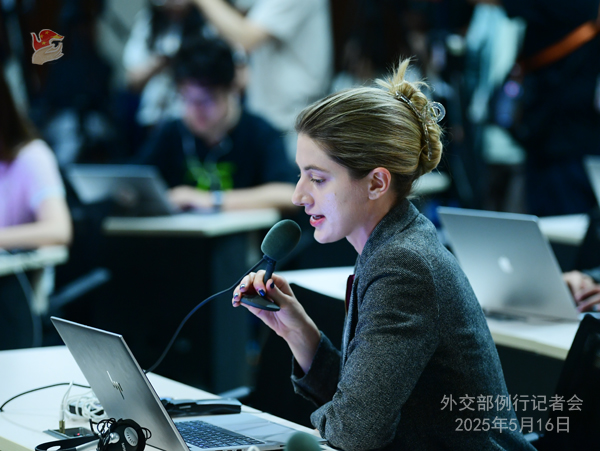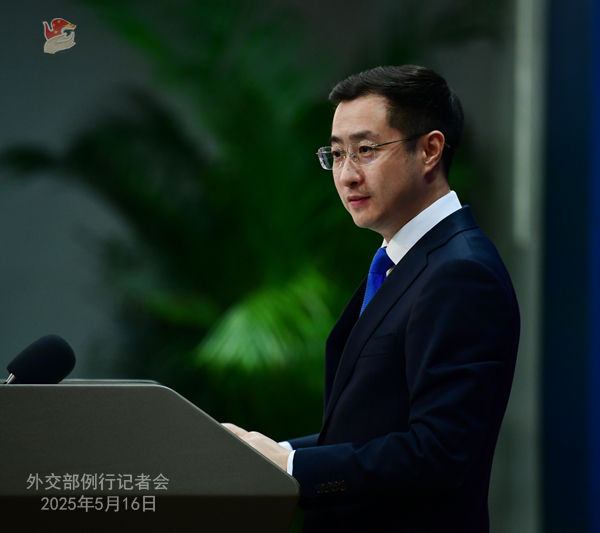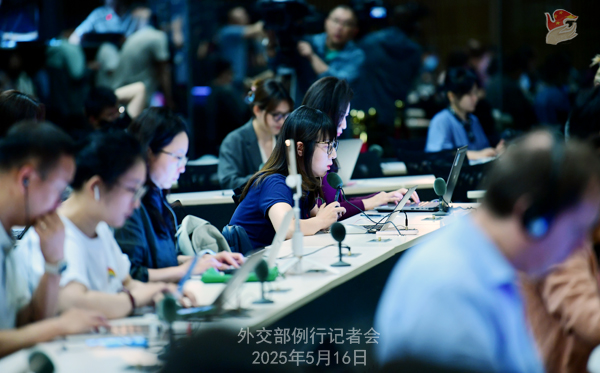
People’s Republic of China


At the invitation of Russia’s Presidential Plenipotentiary Envoy to the Volga Federal District Igor Komarov and Deputy Prime Minister and Presidential Plenipotentiary Envoy to the Far Eastern Federal District Yury Trutnev, Member of the Political Bureau of the CPC Central Committee and Vice Premier of the State Council Zhang Guoqing will be in Russia from May 19 to 22 for the fifth meeting of the council of cooperation between the upper and middle reaches of the Yangtze River and the Volga Federal District and the chairpersons’ meeting of the China-Russia Intergovernmental Commission on Cooperation and Development of Northeast China and the Far East and Baikal Region of Russia.
At the invitation of WHO Director-General Tedros Adhanom Ghebreyesus and the governments of Switzerland and Belarus, from May 18 to 23, Member of the Political Bureau of the CPC Central Committee and Vice Premier of the State Council Liu Guozhong will attend the 78th World Health Assembly in Geneva and visit Switzerland, and then visit Belarus and chair the sixth meeting of the Chinese-Belarusian Intergovernmental Committee on Cooperation.
CCTV: How does China assess the two subnational cooperation mechanisms between China and Russia, namely the Yangtze-Volga cooperation and the Northeast-Far East cooperation? What’s China’s expectation of Vice Premier Zhang Guoqing’s visit?
Lin Jian: Under the strategic guidance of the two head of states, China-Russia relations have been moving forward on a high level and subnational cooperation has been advancing with wider scope and higher quality. The Yangtze-Volga cooperation council and the China-Russia Intergovernmental Commission on Cooperation and Development of Northeast China and the Far East and Baikal Region of Russia, as two major subnational cooperation mechanisms between China and Russia, since their establishment have been operating with high efficiency and played an important role in promoting economic and trade cooperation as well as people-to-people and cultural exchanges between relevant regions of China and Russia in a coordinated manner.
President Xi Jinping’s trip to Russia earlier this month was a full success, where he attended the celebrations marking the 80th anniversary of the victory of the Soviet Union’s Great Patriotic War, and together with President Putin made top-level design and strategic planning for the development of China-Russia relations and cooperation in various fields. Vice Premier Zhang Guoqing’s upcoming trip to Russia to attend relevant institutional events is aimed at implementing the important common understandings reached between the two presidents, taking stock of bilateral cooperation progress, and charting the course for future priority work and cooperation. We believe that under the strategic guidance of the two head of states and with joint effort of both sides, subnational cooperation between China and Russia will continue to grow with vigor and vitality and inject more impetus to our effort of enriching the bilateral relationship, delivering more benefits to the two peoples and boosting our respective development and revitalization.
Reuters: U.S. Trade Representative Jamieson Greer has told U.S. media this week that China agreed to lift export countermeasures that were issued after April 2, including restrictions on rare earth minerals and magnets. China has announced changes to several non-tariff countermeasures but not to the rare earth restrictions. Was Jamieson Greer then misinformed? Is China planning to lift or adjust the export controls for rare earths?
Lin Jian: I’d refer you to competent authorities.

Dragon TV: To follow up on your announcement that Vice Premier Liu Guozhong will attend the 78th World Health Assembly and visit Switzerland and Belarus, could you share more details?
Lin Jian: The 78th World Health Assembly (WHA) will be held in Geneva, Switzerland, from May 19 to 27. Under the impact of unilateralism, global health governance faces considerable uncertainty, and the global community strongly calls for greater health cooperation. China is committed to true multilateralism, and supports WHO in playing a central coordinating role in global health governance. Through Chinese leader’s participation in WHA, China looks to work with various parties to deepen international cooperation in public health and promote the building of a global community of health for all.
China and Switzerland enjoy an innovative strategic partnership. This year marks the 75th anniversary of the diplomatic ties between the two countries. China looks forward to working with Switzerland to implement the important understandings reached by the two leaders of the two countries, enhance political mutual trust, strengthen bilateral and multilateral cooperation, expand cultural and people-to-people exchanges, and pursue new progress in the innovative strategic partnership.
China and Belarus are all-weather comprehensive strategic partners. In recent years, under the strategic planning and guidance of the two presidents, bilateral relations have been growing from strength to strength. During Vice Premier Liu Guozhong’s visit to Belarus, bilateral meetings will be held. He will co-chair with Belarusian First Vice Premier Nikolai Snopkov the sixth meeting of the Chinese-Belarusian Intergovernmental Committee on Cooperation to compare notes on China-Belarus cooperation in various fields. We believe this visit and the meeting will inject fresh impetus to our mutually beneficial cooperation and add new substance to bilateral relations.
AFP: Russian and Ukrainian officials are set to meet in Türkiye for talks in a matter of hours. Does China wish to share any hopes or expectations for that meeting as Ukraine has pressed for an unconditional ceasefire?
Lin Jian: China’s position on the Ukraine crisis is consistent and clear. We support all efforts conducive to peace, support direct talks between Russia and Ukraine, and hope that relevant parties will continue to reach a fair, lasting and binding peace agreement that can be accepted by parties concerned through dialogue and negotiation, and ultimately realize the political settlement of the crisis.
Global Times: It’s reported that the U.S. Bureau of Industry and Security issued a guidance saying that the use of Huawei’s Ascend chips risks violating U.S. export controls. It also warns the public of the potential consequences of training Chinese AI models with U.S. AI chips. What’s China’s comment?
Lin Jian: The U.S. overstretches the concept of national security, abuses export controls and long-arm jurisdiction, and groundlessly and maliciously blocks and suppresses China’s chips and AI industry, which severely violates market rules, destabilizes global industrial and supply chains, and undermines Chinese businesses’ legitimate rights and interests. China firmly opposes this and absolutely does not accept it. China urges the U.S. to drop its protectionist acts and unilateral bullying, and stop its egregious suppression on China’s tech businesses and AI industry. China will take firm measures to defend its right to development and Chinese businesses’ legitimate rights and interests.
Hubei Media Group: We noted that World Economic Situation and Prospects as of mid-2025 released by the UN on May 15 mentions that higher tariffs and trade policy uncertainty have weakened the global economic outlook for 2025, posing multiple challenges to the world, especially developing economies, including China. Global economic growth is projected to slow to 2.4 percent and global trade growth to 1.6 percent. It believes that policy coordination among countries and international cooperation is vital to stable global economic growth and sustainable development. What’s China’s comment?
Lin Jian: We noted the report. Multilateralism and free trade are now facing severe challenges. Facts prove once again that economic globalization is the historical trend, open cooperation is what the world wants, and multilateralism is the right choice. Under the current situation, it’s all the more important for all parties to defend the multilateral trading system and international economic and trade rules, defend the international environment for open cooperation, and realize lasting development and shared prosperity.
The more risks the global economy faces, the greater the need to address challenges through openness, and bridge differences through cooperation. China has all along upheld high-standard opening up and a transparent, stable and predictable policy environment. We have been committed to providing foreign businesses with a pro-business environment that is market-oriented, law-based and world-class, sharing opportunities of our mega-size market with the world, and promoting a universally beneficial and inclusive economic globalization. An open China is always a source of opportunity for the rest of the world.

Bloomberg: The U.S. and Chinese trade negotiators met again for talks in South Korea this week. Can the Ministry provide comment on what was discussed and what are the next steps from the two sides?
Lin Jian: I’d refer you to competent authorities.
AFP: Iran is set to hold talks with Britain, France and Germany in Türkiye today after U.S. President Donald Trump said that a new nuclear deal with Iran was close. How does China view the situation, especially given China’s own series of discussions with Iran and also Russia held in Beijing recently?
Lin Jian: China is committed to seeking a political and diplomatic resolution of the Iranian nuclear issue. We attach importance to Iran’s commitment of not developing nuclear weapons, respect Iran’s right to peaceful use of nuclear power, and oppose any illicit unilateral sanctions. China will maintain communication and coordination with relevant parties, play a constructive role in bringing about a solution that accommodates the legitimate concerns of all parties, uphold the international nuclear non-proliferation regime, and promote peace and stability in the Middle East.
NHK: U.S. President Trump said that he intends to have a telephone conversation with Chinese leader this weekend. Can the Foreign Ministry confirm this? If this is true, can you share more details, including the specific time?
Lin Jian: I have no information to share on that.
Reuters: Reuters reported today that Britain’s audit of its relations with China is expected to be released in early June according to sources. What are China’s expectations for the report and how might the findings affect UK-China relations?
Lin Jian: China and the UK are permanent members of the UN Security Council and the world’s major economies. As global challenges rise, strengthening mutually beneficial cooperation serves the fundamental and long-term interest of both countries and is conducive to world peace and development. We hope the UK will view China in an objective light, adopt the right policy and create a favorable environment for the sound and steady development of China-UK relations.




